When considering whether a food, beverage, or supplement might break a fast, it’s important to first consider what your goals are around fasting. The three most common reasons people fast are for weight loss/metabolic health, gut rest, or longevity. Let’s look at a few items through that lens.
Coffee
Coffee has minimal calories, but what if we don’t drink it black? We’ll take a look at a few popular coffee picks:
Black Coffee
There have been several studies on intermittent fasting where black coffee was allowed within the fasting window and some studies which allowed consumption of any food or beverage within the fasting window, as long as it was less than 25% of energy needs. With those guidelines in place, fasting was still shown to be associated with benefits around health and prevention of disease. In one literature review, coffee was shown to decrease insulin sensitivity. However, similar to the effects of fasting regimens, reduction in insulin sensitivity was observed in a short-term time frame so further studies are required for longer-term impact assessment. During nutrient deprivation, the cells become slightly more insulin resistant likely due to the body prioritizing fuel to go to the brain instead of other cells in the body. However, when looking at the long-term consumption of coffee, regular consumption has been linked with various positive health benefits including reducing the risk of type 2 diabetes.
Even though black coffee contains minimal to no calories, it does promote functions of digestion. Coffee stimulates gastrin (a hormone that stimulates the secretion of gastric acid), gastric acid secretion, and gallbladder contraction, all of which have an impact on our gastrointestinal tract. Coffee intake may also elicit a reflux sensation, which isn’t ideal for those with heartburn issues.
In addition to the metabolic benefits from coffee, one study showed that the consumption of both caffeinated and decaffeinated coffee trigger autophagy in mice. The authors of this study related the increase in mTOR inhibition and other cellular processes to the polyphenols contained in coffee. However, keep in mind this benefit was seen in animals and has not yet been studied in humans.
The Verdict:
- Fasting for metabolic health/weight loss: likely does not break a fast
- Fasting for gut rest: does break a fast
- Fasting for longevity: likely does not break a fast
Bulletproof Coffee
While black coffee is likely fine to drink in most cases during a fast, bulletproof coffees typically have added butter and medium chain triglyceride (MCT) oil. MCT oil, even though calorically dense, has been demonstrated to improve insulin-mediated glucose metabolism and change fasting serum insulin levels. Plus, MCTs are easily converted into ketones by the body and used as energy. In addition to that, MCT oil has been successfully used to induce ketosis in the management of epilepsy, showing that the consumption of MCT oil can still produce a ketogenic environment.
Butter and coconut oil are both fats, but MCTs are produced from coconut oil, it is 100% MCT composition and butter is mostly long chain triglycerides (LCTs), they have a different effect on our gastrointestinal system. MCTs are absorbed directly through the portal vein and taken immediately to the liver, whereas LCTs stimulate pancreatic enzymes and require bile to be released into the gastrointestinal tract. So, with LCTs, the gut is stimulated and digestive processes occur.
Butter is mostly fat with a small portion of protein. Typically, protein inhibits autophagy, however butter contains such a small amount it’s unlikely that it has an effect. MCT oil contains no protein and is only fat. Energy restriction is also important for autophagy. MCT oil and butter are high calorie foods, so overconsumption of these two items may not provide the low nutrient environment necessary for these longevity benefits. For example, a typical bulletproof coffee calls for 2 Tbsp. butter and 1 Tbsp. MCT oil, which provides ~320 kcal. Therefore, it’s possible that this amount of energy intake either slows or stops these desired benefits of fasting.
The Verdict:
- Fasting for metabolic health/weight loss: likely does not break a fast
- Fasting for gut rest: though MCT oil has minimal impact on the digestion, coffee and butter break a fast focused on gut rest
- Fasting for longevity: likely breaks a fast
Coffee + Cream
Plain, high-quality dairy by itself likely does not contribute to weight gain or increased risk of metabolic disease. One study was even able to show an association between consumption of trans-palmitoleate (a fat found in milk) and lower fasting insulin levels. However, quantity is key since a couple Tbsp. of cream/milk in coffee is very different than a few cups.
Cream, milk, and other dairy products contain carbohydrates, protein, and fat that do require digestion, so the gut is activated after consumption. Research is limited on dairy and its role in autophagy, but a few studies have shown that high-quality dairy consumption does not increase risk of chronic disease.
The Verdict:
- Fasting for metabolic health/weight loss: likely does not break a fast in small quantities
- Fasting for gut rest: breaks a fast
- Fasting for longevity: likely does not break a fast, but research is limited in this area
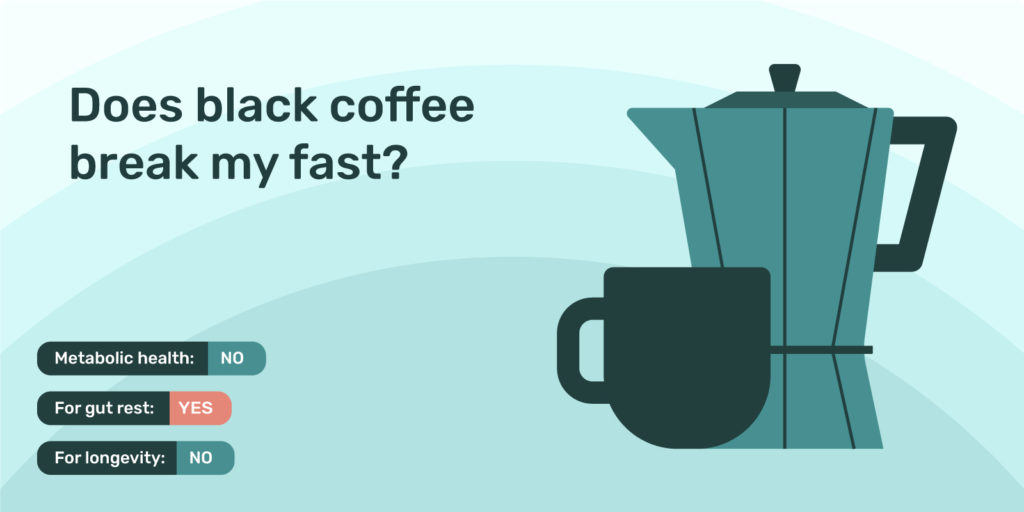
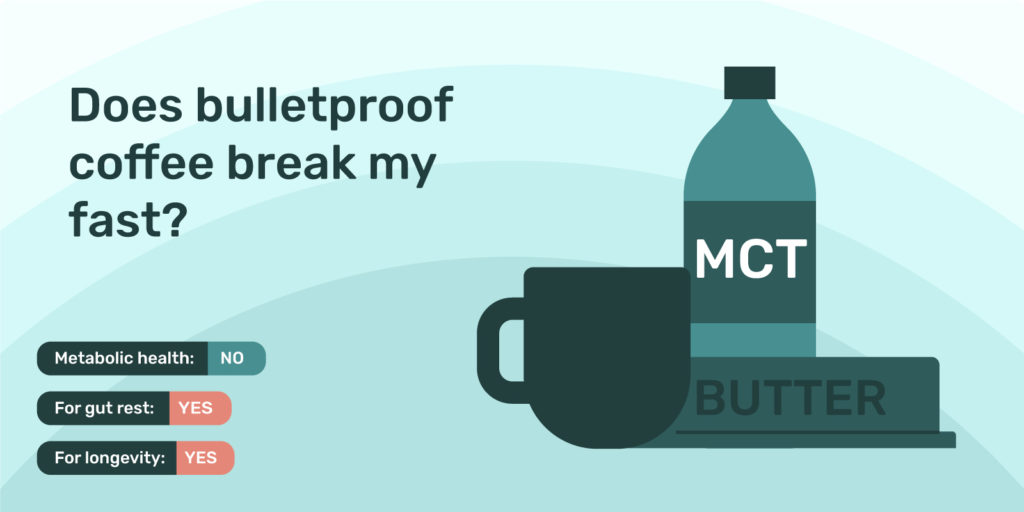
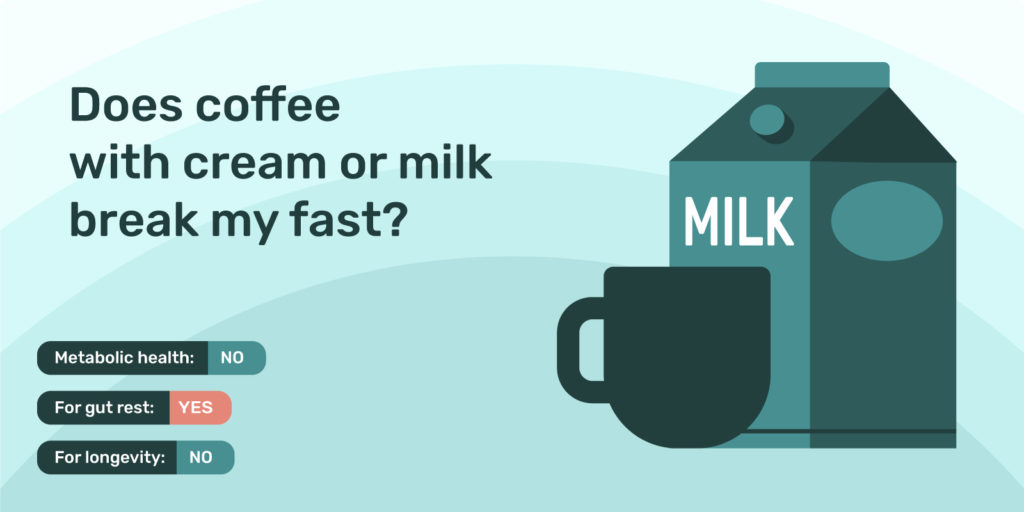
Tea
A limited number of epidemiological studies have been conducted to determine the association between tea drinking and BMI, but methods for evaluating tea intake as well as numerous confounding variables make tea consumption and weight loss claims relatively weak. Rather, studies evaluate benefits associated with mega doses of the polyphenols found in tea. That being said, plain tea has nearly zero calories per cup, so it likely won’t interfere with ketogenesis and the metabolic benefits people seek from fasting.
On average, tea contains about 2 kcal per 8 fl. oz. cup and about 0.4 gm carbohydrates. Consuming tea in small quantities likely does not provide enough energy to have a big impact on digestion. However, there are many different varieties of teas, containing different ingredients and different quantities of caffeine. Some teas such as peppermint or ginger have been traditionally used to sooth digestive issues, but whether or not tea consumption leads to increased GERD (gastroesophageal reflux disease) symptoms is still up for debate. One meta-analysis concluded that there was no significant relationship between tea consumption and the risk of GERD. However, certain subgroups, such as those from Eastern Asian or Middle Asian descent, may be at higher risk.
There have been a few studies looking at specific properties of tea and its potential to trigger autophagy. These studies have pointed us in the direction of tea’s polyphenols, isoflavones, and other components involved in various mechanisms of autophagy, however, these were all done at the cellular level. Research in humans using realistic doses of tea are very limited. Even though we can’t draw conclusive evidence from these studies, at least we can make an educated guess that tea does not inhibit autophagy.
The Verdict:
- Fasting for metabolic health/weight loss: likely does not break a fast as long as sugar isn’t added
- Fasting for gut rest: dependent upon your personal response to tea and the type/quantity you consume
- Fasting for longevity: likely does not break a fast
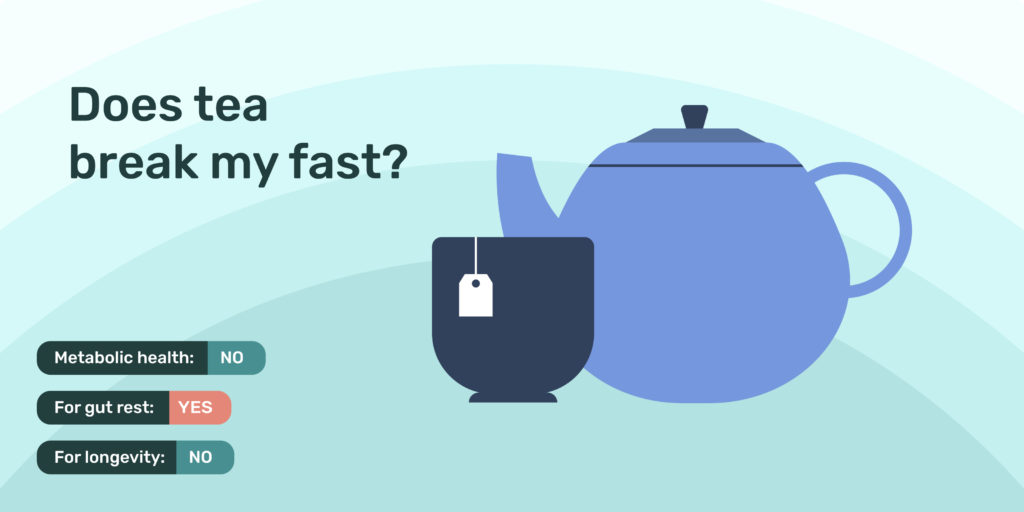
Lemon Juice
One ounce of pure lemon juice only contains 7 kcal and about 2 grams of carbohydrates. Taking the aforementioned 25% of caloric needs as a fasting protocol framework, ingestion of a 3 ounce serving of pure lemon juice, contributing 6 grams of carbohydrates, is not enough to disqualify you from being in a fasted state nor is it enough to push someone out of ketosis.
Lemon juice does contain calories and carbohydrates which will need to be digested, so the gut will be stimulated. The carbohydrates in lemon juice are a mix of sucrose, fructose, and glucose, all of which need to be metabolized by the gut and liver.
Some research suggests that over consumption of fructose can lead to health issues such as NAFLD and obesity. However, others argue that the source of fructose may be more important, stating that high intake of fruits with high fructose content can be associated with good metabolic health. Since lemon juice is only 20% fructose per carbohydrate gram and since we generally do not consume large quantities of lemon juice, it likely does not have a significant impact on longevity and long-term health.
The Verdict:
- Fasting for metabolic health/weight loss: likely does not break a fast if consuming less than 3 fl. oz.
- Fasting for gut rest: breaks a fast
- Fasting for longevity: likely does not break a fast

Bone Broth
Bone broth does contain protein, a small amount of carbohydrates, and sometimes fat. Carbohydrates and protein can kick someone out of ketosis if consumed at high enough quantities. Those specific quantities vary from person to person, but in general, more than 50 grams of carbohydrates and more than 80 grams of protein can be sufficient to completely prevent ketone production. The nutritional content of bone broth varies greatly based on the method of cooking, duration of cooking, and ingredients used—that said, on average, one cup of bone broth ranges from 31 to 86 kcal, 0.2 to 2.9 grams of fat, and 4.7 to 6 grams of protein. These amounts are unlikely to completely kick someone out of ketosis, but may slightly slow down the breakdown of fat.
Though bone broth is sometimes used for gut health, it typically contains carbohydrates, protein, and fats; all of which need to be digested and stimulate the gut.
In one animal study, they saw an inhibition in autophagy when supplemented with glycine (one of the main amino acids in bone broth). However, it is questionable whether this translates to humans. When looking at other aspects of health, bone broth contains essential nutrients such as calcium, magnesium, potassium, and collagen, so it is a nutrient-dense product that can be useful for optimizing nutritional intake. For overall health impact, bone broth is a positive choice, but for promoting autophagy more research is needed.
The Verdict:
- Fasting for metabolic health/weight loss: likely okay to consume in small quantities, but you may not see as significant results with fat loss and metabolic health
- Fasting for gut rest: breaks a fast
- Fasting for longevity: more research is needed, so likely best to avoid if fasting for this reason
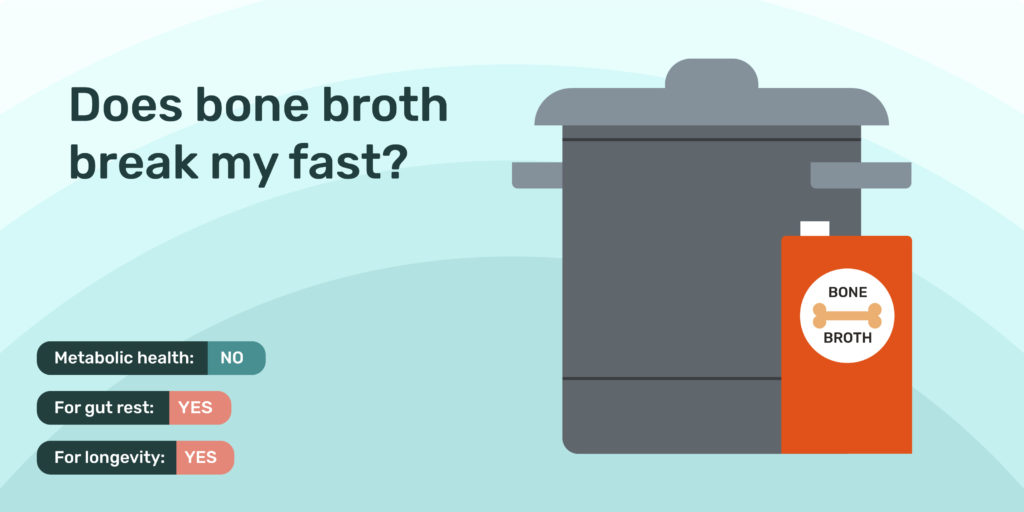
Gum
The type of gum has an impact on whether or not it breaks a fast. Original gum contains sugar, which we consume when chewing it. If you’re having multiple pieces per day, the calories and grams of sugar can definitely add up. For example, Original Bubble Yum has 25 kcal, 6 grams of carbohydrates, and 5 grams of sugar per piece. If you were to have 4 pieces in one day, you’d be getting 100 kcal and 20 grams of sugar. This will likely have an impact on ketogenesis and your ability to optimally burn fat. Sugar-free gums made with sugar alcohols will still provide a small amount of calories. For example, Spry gum has 1.7 kcal and 0.72 g of carbohydrates per piece. In very large doses, some studies have shown xylitol to cause a small increase in glucose and insulin levels. However, the quantity used was equivalent to over 40 pieces of gum, which is an unrealistic amount to consume in one day.
Regular sugar gum will require digestion and metabolism. Sugar-free gum is debatable. Our bodies are unable to completely digest and absorb 100% of sugar alcohols, though all are partially absorbed to some degree, which triggers our gut.
Sugar consumption in excess is related to poor health and higher risk of chronic disease. So, consuming sugary gum, especially when trying to fast for these benefits, isn’t a good idea. Sure, 5 grams of sugar a couple times a month probably won’t have a long-term impact, but if you’re consuming this daily while intermittent fasting, or it starts to trigger a sugar craving, then having this gum could be causing more harm than good. For sugar-free gum, research is limited on its effects on longevity and autophagy. From the limited research that exists, they are probably safe to consume. Sugar-free gum, ingested in non-excessive amounts, would not impact an individual’s energy-deficient state nor would it account for amino acid uptake. It is therefore reasonable to assume that there would be minimal impact on the regulation of autophagy.
The Verdict:
- Fasting for metabolic health/weight loss: regular gum breaks the fast, sugar-free gum does not
- Fasting for gut rest: breaks a fast
- Fasting for longevity: regular gum breaks the fast, sugar-free gum likely does not
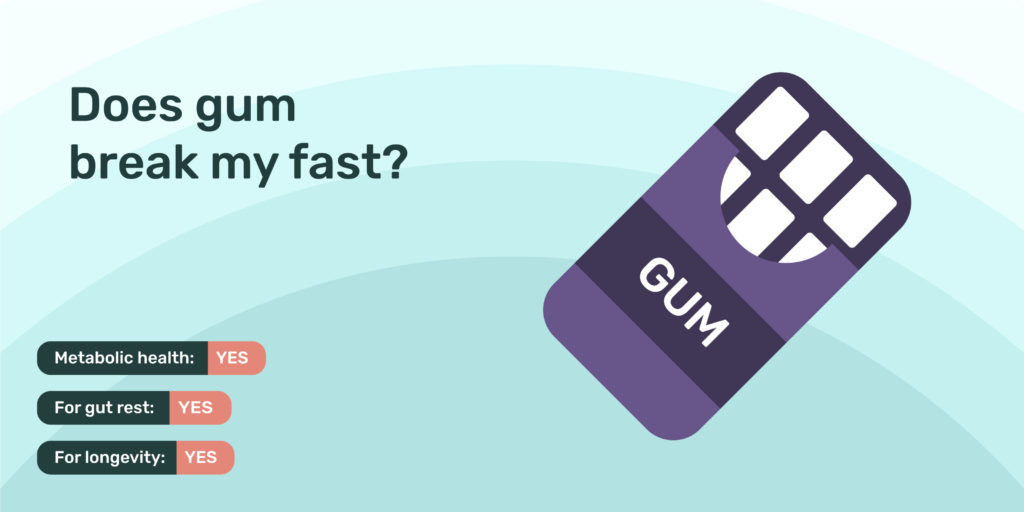
Apple Cider Vinegar
A tablespoon of apple cider vinegar (ACV) has 3 kcals and 0.1 grams of carbohydrates—in essence, very little nutrients. This small amount likely does not inhibit ketosis or the ability to break down fat.
Apple cider vinegar promotes stomach acid production, so it does stimulate the gut.
Apple cider vinegar does not contain protein and contains minimal calories, so nutrient sensing pathways involved in autophagy are likely not triggered with its consumption. The benefits of ACV are mostly seen with improving stomach acid/reflux issues and its connection to greater health and longevity benefits is still up for debate.
The Verdict:
- Fasting for metabolic health/weight loss: likely does not break a fast
- Fasting for gut rest: breaks a fast
- Fasting for longevity: likely does not break a fast
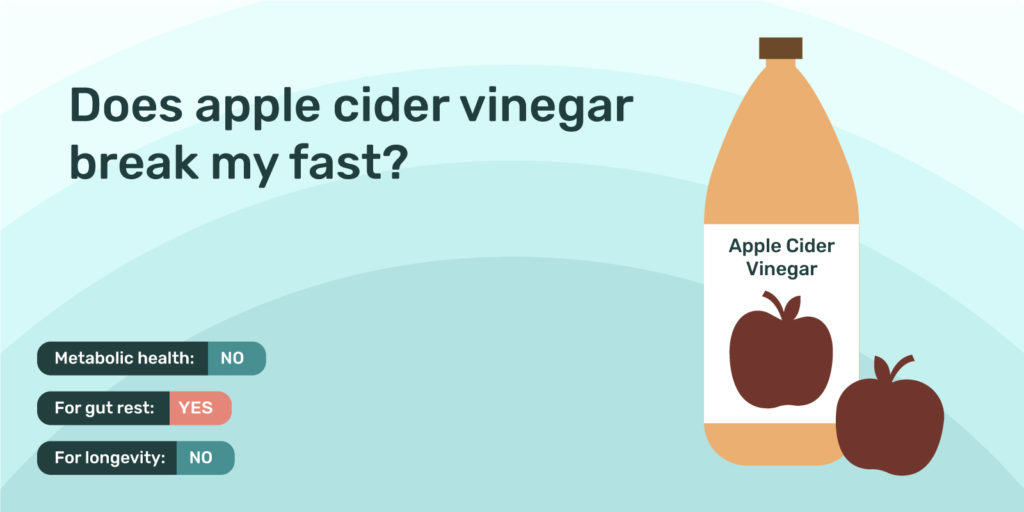
Fish Oil
Fish oil itself is a fat, which contains 9 kcal per gram. The average dose of a supplement is anywhere between 1-2 grams, so if you take fish oil, your body will need to metabolize those calories. However, fat doesn’t stimulate insulin release, and the 9-18 kcal that the fish oil provides has minimal to no impact on your body’s ability to break down its own fat stores.
That being said, fish oil is a polyunsaturated fatty acid, which has to be digested and absorbed. Meaning—you guessed it—the gut will be stimulated after taking fish oil.
Fish oil is high in omega-3 fatty acids, which are anti-inflammatory. The molecules have been shown to decrease inflammatory cytokines such as interleukin 1 (IL-1), Il-6, and tumor necrosis factor (TNF). In addition to its anti-inflammatory properties, omega-3 fatty acid consumption is positively associated with the reduction of risk for many other chronic diseases such as heart disease, stroke, rheumatoid arthritis, and cancer. Some studies have even shown that both EPA and DHA (fatty acids found in fish oil) may induce autophagy.
In Summary:
- Fasting for metabolic health: fish oil likely doesn’t break a fast
- Fasting for gut rest: fish oil does break a fast
- Fasting for longevity: fish oil likely doesn’t break a fast
Herbs and Spices
Most herbs and spices have fewer than 5 calories per teaspoon and have almost no impact on blood sugar levels or your fat burning ability. However, watch out for ingredients that often accompany herbs and spices, like sugar or those found in fat emulsions. Herb/spice blends that have sugar raise blood sugar levels and elicit an insulin response. Other blends mixed with fat have a higher caloric content. To play it safe, stick to pure herbs and spices, either fresh or dried.
Herbs and spices come from plants, so the majority of calories they have are from carbohydrates with a small percentage of protein. Roughly half the carbohydrates are fiber, which is undigested, but a small portion of the carbs that remain will slightly stimulate the gut for digestion and absorption.
The minimal calories and protein found in herbs and spices alone probably aren’t enough to inhibit autophagy. There are even a few studies that show promise with specific herbs promoting or enhancing autophagy.
In Summary:
- Fasting for metabolic health: herbs and spices don’t break a fast
- Fasting for gut rest: herbs and spices do break a fast
- Fasting for longevity: herbs and spices likely don’t break a fast
CBD Oil
Since CBD oil is fat, and fat alone will not kick someone out of ketosis, CBD oil is likely fine to have while fasting if your goal is metabolic health or weight loss. As long as the CBD oil doesn’t have any added sugar or another source of carbs, it doesn’t stimulate insulin (stimulating insulin will derail ketosis and fat break down).
If you consume your CBD oil orally and swallow it, it’s digested, absorbed in the small intestine, and transported into the liver to be metabolized. (The oil also usually has calories and fat that need to be broken down, too.) Therefore, CBD oil stimulates your metabolism and gut.
One benefit of fasting is reduced inflammation, and as it turns out, one common reason people consume CBD oil is for its positive effect on inflammation. A few studies have also shown a positive impact with CBD and its role in autophagy. So if you’re fasting for longevity, CBD oil shouldn’t derail the benefits of your fast.
In Summary:
- Fasting for metabolic health: CBD oil likely doesn’t break a fast
- Fasting for gut rest: CBD oil does break a fast
- Fasting for longevity: CBD oil likely doesn’t break a fast
Branched Chain Amino Acids (BCAAs)
If you exercise, you might consume BCAAs, which promote muscle protein synthesis. They have also been shown to have positive effects on body composition and glucose levels. However, if body composition and/or fat loss is your goal, make sure to choose sugar-free BCAA mixes without additional carbohydrates.
All amino acids are digested and absorbed in the small intestine. In addition to that, almost all BCAA mixes contain additional ingredients outside of the BCAAs, most of which will also need to be digested and absorbed.
If autophagy is your goal, then protein supplements and BCAAs break a fast. When you fast, growth pathways like IGF-1 and mTOR are suppressed, which is needed for autophagy to occur. If you consume protein during your fast, specifically BCAAs such as leucine, you will stimulate these pathways and inhibit autophagy.
In Summary:
- Fasting for metabolic health: BCAAs likely don’t break a fast
- Fasting for gut rest: BCAAs do break a fast
- Fasting for longevity: BCAAs do break a fast
Surprised by one of these? Let us know what you thought in the comments, and request other items for us to cover in this series.
- The Complete Guide to Fat Burning - April 30, 2024
- Zero Live #4: 3 Ways to Boost Fat Burning - March 28, 2024
- Zero Live #3: Nutrition, Fast Breakers, and Fasting - March 11, 2024
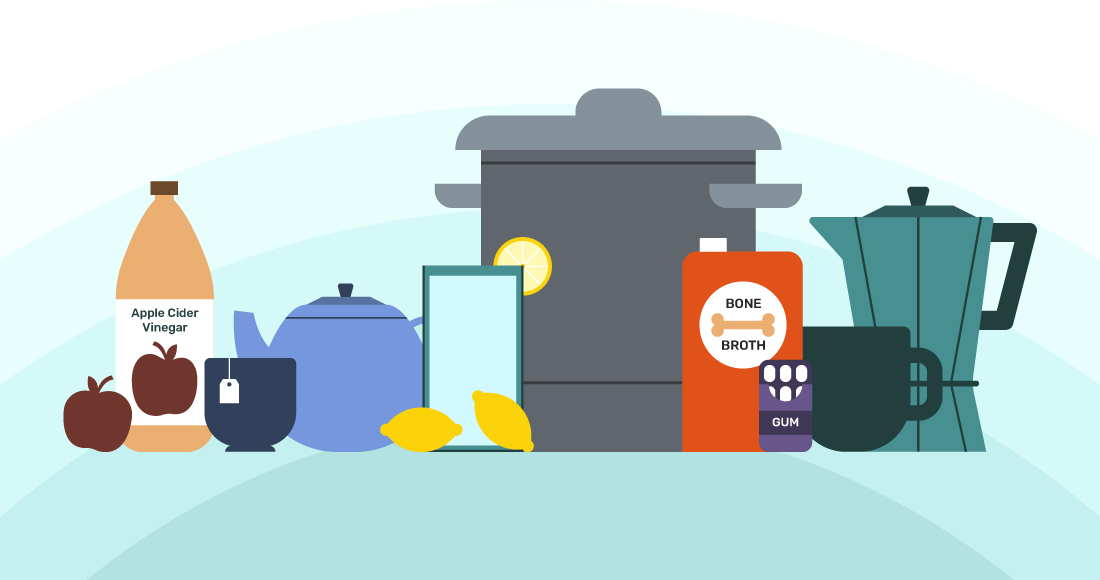


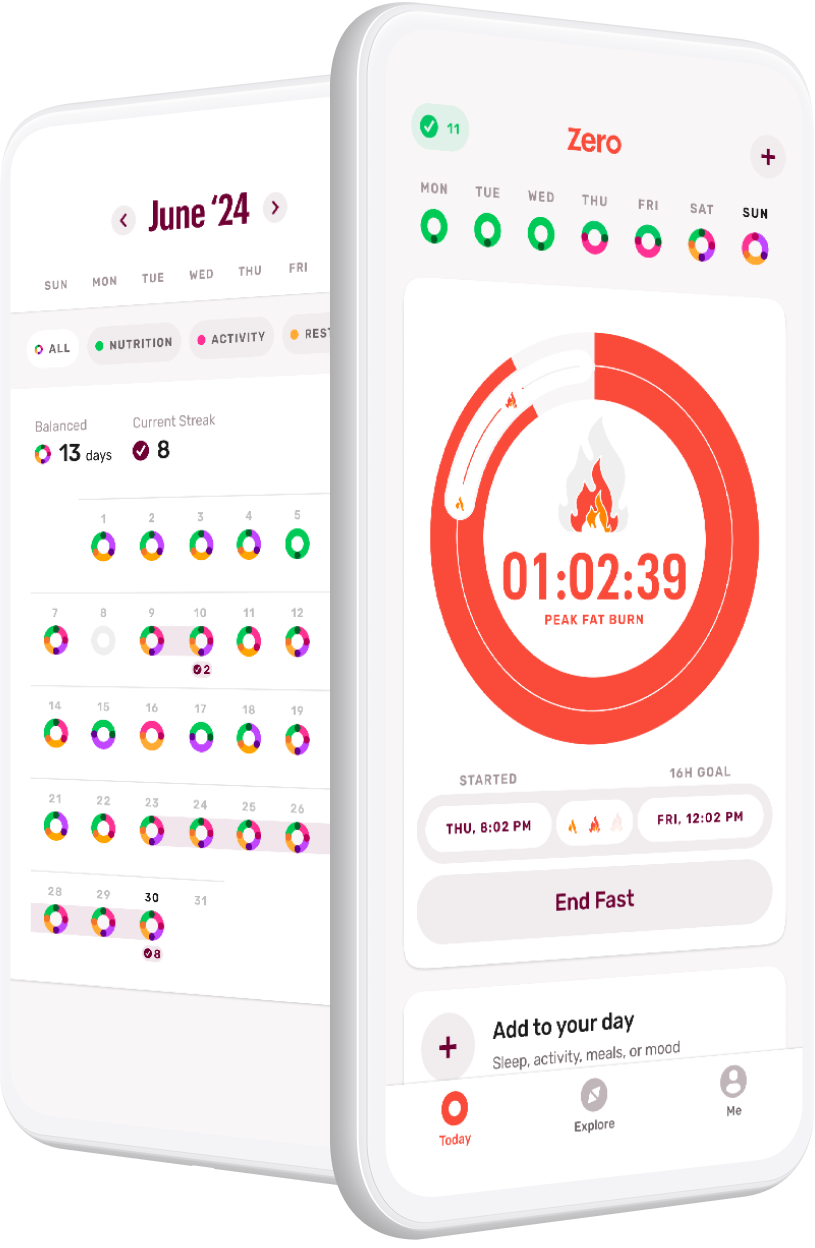

Does an unsweetened strawberry tea break a fast or a lime flavored sparkling water break a fast? Thanks
Did you even read the article?
🤣
😹
Damn you need a coffee Viktor!
An unsweetened herb or fruit tea will not break a fast if you’re fasting for weight loss and health. It will break a fast if you’re trying to rest your gut. In fact, basically everything except water will break your fast if you’re trying to rest your gut. If your fasting for longevity, it should not break your fast. 🙂
How about less than 1!2 cup of almond milk in coffee?
I have the same question – but for unsweetened soy milk.
Doesn’t break the fast!
What about chewing Nicolette gum while on a 5 day fast??
I lover the Zero app and think this type communication can help health of many people. By the way my sister lives in Bozeman. Is Zero out of Bozeman?
I chew 2 mg sugar free mint Nicorettes. Don’t know if it breaks the fast but it hasn’t caused me any issue.
Yes, Nicorette gum breaks a fast if doing for gut rest.
Very good thank you .
Great inf thanks
I love IF
What do you mean by gut rest??
I think this means you will start the digestion process so your gut will no longer be resting.
Does mouthwash or a breath mint break a fast?
Breath mint I believe will break a fast. I don’t think you should consume mouth wash as you would normally spit it out so it should be okay if you are doing that.
Does taking vitamins/supplements/medications break a fast?
Yes, they do. Check out Thomas DeLauer videos on YouTube. He talks about it. Autumn Bates is great too.
Hey guys,
Does casein protein with a bit of milk break a fast? I like to take these slow proteïnes before going to bed.
What about the multivitamins you dissolve in water?
Does regular (not low-sodium) vegetable broth break the fast, in terms of metabolic/insulin-lowering effects?
Thank you!
No, if only a small amount is consumed.
I typically will drink about 16 ounces during a 24 hour fast. Thanks for your reply!
Does taking thyroid medication or adrenaline fatigue medication such as DHEA break a fast?
These things technically break your fast. But honestly I wouldn’t worry about it. If your fasting for 5 days and that’s all you have to take I would say that’s a major achievement.
Rule of thumb if you consume anything your breaking your fast. That includes water but that’s only if your dry fasting.
I cannot believe that Thyroid medicine would break a fast, but if you take it in the morning on an empty stomach (as you should) near the end of your fast it wouldn’t make an impact either way.
No. Take it with water or plain tea and you’ll be just fine. Don’t sweat the small stuff! The major impact is food and calorie laden drinks. If you want digestive or gut rest, then take your medications, but only consume water.
Does black coffee with 1 teaspoon sugar break my fast?
Yes. It’s theoretically the same as sugar gum versus sugar free gum.
Yes…any calories especially sugar 😈breaks the fast.
Check out Stevia instead of sugar. The serving size is 1tsp w/2kcals and 2 carbs. However what they don’t tell you is 1 tsp = 1 cup of sugar in sweetness. In other words using the tiniest amount has a big impact on your coffee but not your waistline.
So stevia drops would be ok???? I just started yesterday and I miss my morning coffee sooooo much, but if I can have s drop or two of the stevia drops that would help. I’m just looking to lose weight and get my gut healthy.
Thanks for this! Very informative esp during my fast.
Can I drink wine while fasting? I always drink water but I usually fast at night and I’ve been drinking wine? Please help me out on this
It is alcohol. That breaks down into sugar. You decide.
Yes, alcohol absolutely breaks a fast
Thanks for the article. What about salt, taken as it is?
You eat salt by itself?
Can more information be shared on wether/what supplements break a fast?
There is a separate article on this.
Would block coffee with just a tad of sweetener such as jaggery powder or even stevia, break the fast?
Likewise would lemon water with honey break the fast?
Sorry for Typo – it’s Black Coffee
Anything sweet will considering break the fast. Better just go for black coffee~ For better taste, dilute black coffee with more water~
What about matcha?
Cola zero?
It has sweetners in it and majority of sweet things break a fast, but that’s just what I think
Hi,
Does a gingershot break your fast?
Does zero drinks (coke zero) breaks a fast?
Yes , anything with any kind o sweetener including stevia aspartame whatever will provoke an insuline response .
I believe that it would. While it has no calories, the sugar is replaced with an artificial sweetener such as aspartame which will break down as fat.
I was wondering if i take about 2 table spoons Apple cider Vinegar and 1 lemon in de morning when i wake up if that’s oke in my fasting window.
In addiction in my evening fast i drink loads of thea. not sure with this article if that’s oke.
Is a thyroid pill in the morning breaking a fast ?
Does water break a digestion rest fast? I am advised to drink plenty of water.
Does medicine break a,digestion fast likely yes but a necessary evil.
I know the other two listed types these would not break it seems the digestion rest fast is the strictest
What about black coffee + sugar/sweetener?
Black coffee only, no sweetener. The article above explains it in detail..
Diet coke break a fast?
I am not an expert at all, but by pure logic I would say if lemon juice, which is an acid, breaks a guy resting fast, coke zero would too for sure, because it’s an acid too.
Not to be a dick or anything, but “likely diesnt break a fast” doesnt sound convincing at all. Might as well just say “maybe it does, maybe it doesn’t”. But it at least makes it clear that if you want the full benefit of fasting, just stick to water and water only.
Can you please include the research articles for this information.
It would really strengthen and allow us readers to trust the evidence.
Thank you.
The hyperlinks to the research articles are highlighted in blue within the article.
Doea eating 3-5 almonds break my fast?
Sure!, almonds break your fast, everything with more than 5 calorie break your fast!
Yes and you will be hungrier after eating them then you were before.
Good to know. I’ll make sure not to over do it with the coffee+cream from now on.
Awesome read! Thanks for the information. I would like to know more about taking suppliments and medicines during a fast.
Magnesium, Potassium, Vitamin D, Fish Oil, Vitamin B, and NAC are all on my daily intake regiments.
I assume all of them will cause a response, as they have to be processed by the body, but knowing how, and when, to take suppliments during a multiple day water fast is really the only thing stopping me from trying a 72 hour fast.
I ate 500 calories n I walked it all off does it break my fast?
Yes. Every calorie over 5 break your fast
So deit sodas don’t break fast because of the zero calories?
Walking it off does not equal to you didn’t eat at all.
It’s not complicated : any food substance provoked digestion so it breaks your Fast. It has nothing to do with whether you exercise to walk it off.
Any sweet (even zéro calorie) substance breaks your fast because it provokes an insuline response.
Forget everything you have been told about « calories in calories out » read the ne research or example Jason Fungs book « obesity code »
Interested in know if zero calorie seltzer water breaks the fast.
Does vital proteins unflavored collagen break a fast?
From what I researched, no because it is just protein and close to no calories. I only drink black coffee with one scoop of vital proteins.
According to Dr Fung protein breaks a fast so I’d save the gelatin for after you break your fast.
Wondering if toothpaste would break a fast, because my tongue creates a lot more saliva when I brush my teeth early in the morning and late at night…
It is advised that you don’t eat toothpaste so therefore I would think it’s okay to have clean teeth as long as it’s not getting consumed.
Pretty sure insulin breaks a fast but I’m also curious about the zero calorie seltzer water.
Also, forgive my ignorance please, but what is autophagy?
I like to drink a 16 oz Sparkling Water Energy Drink each morning. It contains zero calories, zero sugar, zero carbs however contains 150% daily value of Niacin, Vitamin B6, B12 and Pantothenic Acid; as well as 50mg of Guarana, Gingseng and 150mg caffeine – will this break a fast? Thank you!!
Is it sweet ? Then it stimulates your insulin production and breaks your fast
What about consuming b c aa powder in my water ? Will that break fast if it has a couple calories
Hi
Dose Zocor medicine break a fast?
Thx
The article says high quality milk/cream doesn’t break fast. I use 35%heavy cream, what amount would be acceptable in not breaking fast, anyone know? Like, a tablespoon ok?
I just looked in my fridge and my heavy cream is 50 calories per Tablespoon. That will definitely break your fast. There are 3 teaspoons in a tablespoon, so even that small amount will break your fast. It’s best to stay away from the heavy cream while fasting 🙂
Does fresh celery juice in the morning break a fast?
Not a coffee drinker..will mint tea break my fast
No if it’s not sweetened or with cream
So… Let me get this straight. A little cream in my coffee in the morning will not break my fast? I’m really hoping that it’s right…
Key word is « little » as in not 3 tablespoons
Yes it will break your fast it has to be plain black coffee. A really helpful tool is to read the book delay don’t deny and intermittent fasting lifestyle. It breaks down all the rules and makes you understand why you can’t drink certain things while fasting!
I drink great value sugar free lemon aid. It has 10 calories and 1 g of carbs. It’s like a flavour package. Would this break my fast.
Does Vitamin Water break a fast?
I’m just getting into fasting and wondering if a Zero Sugar/Calorie Energy Drink and zero calorie/sugar cola would break a fast? I know my energy drink has 2 carbs and 1 gram erythritol in it plus some vitamins and such. Any help would be much appreciated. Thank you
Maybe not zero calorie drinks but if it contains a sweetener it will break your fast
Ok. Thank you. The energy drinks contain 1 gram of erythritol sweetener (which is what I use in keto). It contains no calories. However my diet drink contains aspartame(?) I believe, but still no calories.
Will 100% cranberry juice break a fast?
Hi
What about medicine? Can you take medicine while fasting ? Ex: nexium or any other reflux medicines ?
I’ve noticed there are lots of questions regarding how meds may or may not affect a fast. I think it’s important to check with your prescriber before stopping any meds!! Also, thyroid meds are often prescribed to provide the hormones that our body can’t produce….I can’t see how that would break a fast.
Would be interested to know how zero calorie, artificial sweeteners affect a fast. My understanding is that many of these sweeteners are indigestible alcohols which makes them zero calorie, but does the body sense the sweet taste and prepare itself for calories? If so, I’d think it would break the gut fast at the very least.
Will melatonin break a fast?
Do cold syrup brake my fast ?
Can I uses half and half in my coffee?
Will this break my fast ?
is there any throat lozenges i can have when im a bit sick and need relief?
I love this app so much! This was very informational. Thanks Zero 🙂
Will berry (blackberry, blueberry, strawberry), grape or Apple infused water break a fast?
I don’t understand what Gut Rest means. Everyday I drink Green Tea with 3 teaspoons of lemon juice. This sounds like it will disrupt my fast since it disrupted my gut rest is this correct?
Also reading in the comments that having anything 5 calories breaks the fast. I thought it was 50 calories?
Does unsweetened almond milk in coffee, if serving size is 30 calories, break the fast?
Will watermelon flavored Extra gum break it?
How many calories does Mountain Dew have
Does water plus chia seeds break ky fast?
What does the category “fast for longevity” mean?
I’m so happy I love black coffee. It makes me forget about the fast, especially before a workout during winter!
Do antidepressants break a fast?
Either way, definitely take them when you need to. They are more important than possibly breaking the fast.
What about milk? (Probably not, but thought I’d ask) also what about protien shakes me being an average lifter?
Does sugar free squash break fasting? And also sugar free free jelly? I suppose it does as the body has to be active to process it …?
Will miso soup (broth only) with dashi break my fast?
I’ve been trying to assess whether Stevia breaks a fast. I’ll add it to my butter detox tea, but it contains cane alcohols. These have technically zero calorie but are derived from sugar cane.
Will sugar free Metamucil break my fast in the morning ? Or taking my blood pressure medication?
New to this . Diet sodas will they break a fast?
Do a protein bar (Zele) break my fast?
Would a flavored coffee ( kcup hazelnut coffee) be ok? Nothing else added
I would like to know if colagem peptides in water would break a fast if I consume half the serving which is about 30 caps. If it doesn’t break the fast, how many “30 caps” during the fast could I drink?
I’m just getting started fasting. Health issues are a huge driving force in making the decision to make this life style change, BUT in the meantime, I’m on multiple medications that I’m really need to take in the mornings. Does this break my fast?
Okay, i was doing strict 18:6 fasting for 12 days and lost 5 lbs and yesterday I ate pasta during my fasting window!!!!
So My question is now what? I start all over again? I stepped on scale and gained the 4 lbs back.
So do i got back to 18:6 starting today or tomorrow start ot again or do 20:4 which i can do?
So then BCAA doesn’t break a fast right? If I read and am understanding right then if it doesn’t have any calories or sugar it doesn’t break a fast…right??
Does the Goli ACV gummies break a fast?
Does medication such as antidepressants break a fast for weight loss? If so how can you help this during the fast? Also is it possible to pause a fast?? Thank you 😄
If I add Nutpods (the nut or oat version) into my coffee with vital proteins collagen and MCT oil, does that break fast?
Does anyone know if Swerve will break my fast? I normally use Stevia drops but I did not have any today and used swerve brown sugar for my coffee. No cream or milk
Does a Bang energy drink or chewing tobacco break a fast?
Does taking hypertension & cholesterol medicine break my fast?
Two questions
– does taking adderall in the morning break my fast?
– does MCT alone in black coffee break a fast?
i take georges fractionally distilled 100% aloe vera juice in the morning for my gastritis which tastes like nothing but water, will it break my fast? thanks
Apple cider vinegar was addressed in the article, but I was wondering about the apple cider drinks (not just a tablespoon). I like the Bragg Apple Cider Vinigar drinks that have about 20 calories for a 16oz bottle. If fasting for weight loss would it break the fast?
Does celery juice break the fast
Does sparkling water or flavoured sparkling water break a fast? I usually drink a little when I fast and I don’t believe there’s a problem with it but idk.
All zero calorie ofc.
Can I take Vega electrolytes during fasting ?
Hi,
Does a pickle break the fast?
Thanks and stay safe.
Two questions
– can I still count it as me fasting even though I have to take vitamins in the morning?
-dose taking medication (depression & anxiety) brake a fast?
What about multi vitamins if there is no label showing calories – is it best to wait until fast ends or take while fasting?
Does alcohol or juice break the fast?
Will a serotonin supplement before going to bed break my fast?
Does pre workout break a fast